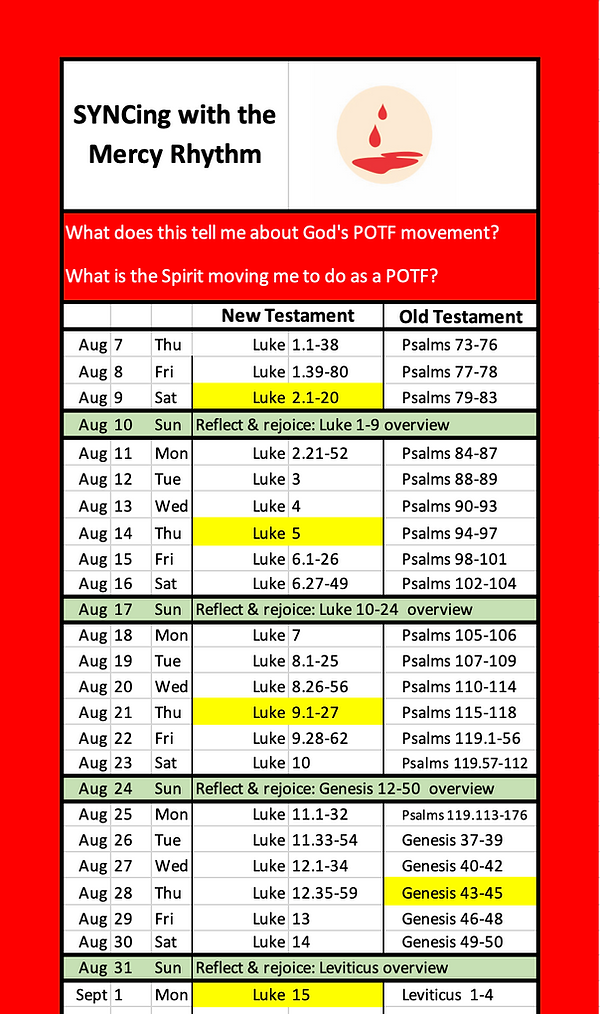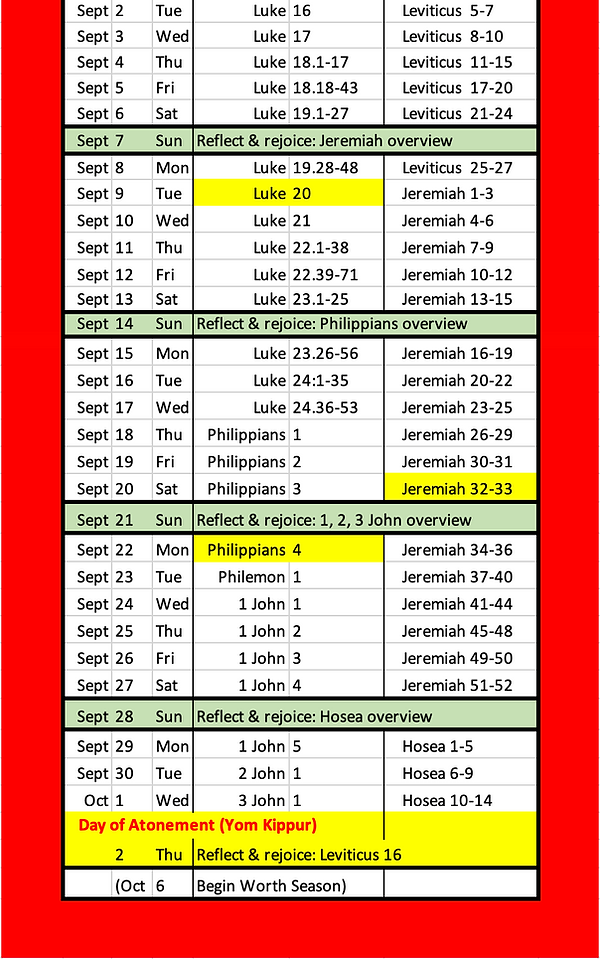The Bible is the story of God's People of the Future movement from ancient times to today and into the future. If you use the SYNC Bible reading guides for the other six SYNC "seasons," you will cover the whole Bible in a year. The big story of the movement gets clearer and richer as you appreciate it from all seven seasonal angles.
As explained below, the readings for Mercy Season focus on the books of the Bible that tell us the most about the way that mercy and forgiveness fit into this whole connect-heal-bless campaign that Jesus is leading.
Daily reading of the Bible keeps us in SYNC with God's mercy if we keep asking ourselves,
-
What does this Scripture tell us about God's campaign to connect, heal, and bless the world?
-
What is the Spirit moving me to do as a member of God's POTF movement today?
God's Spirit will keep giving you fresh answers to those questions. The backdrop for all those fresh answers is the blood of Jesus dripping from the cross. He is the picture of mercy, the compelling example that guides his POTF movement to live as agents of mercy.
For once-a-week readings instead of daily, use the items highlighted in yellow in the table below.
For one verse per day in a weekly cycle, use the Jubilee Cards (see under "Activities").
How Mercy Season fits into the bigger story of God's POTF movement
Mercy achieves all three goals of God's campaign to connect, heal, and bless the world:
-
It is only by the mercy of the cross that we can CONNECT with God at all.
-
Mercy brings HEALING to others and to us. The desire for revenge is universal, toxic, and addictive. When we forgive, that desire is broken and we heal from the wounds others inflicted on us.
-
Mercy BLESSES us with the confidence that God is for us and that he enables us to forgive others. This is so liberating and inspiring!
Here is a preview of some of the perspectives on mercy in the biblical books we will read during Mercy Season:
Old Testament
-
Genesis 37-50 (the Joseph story): Joseph's eleven brothers sold him into slavery. Over the years, God directed Joseph's life to get him out of slavery and into a position of power in Egypt. God also directed the lives of Joseph's brothers and put them at Joseph's mercy. Instead of using his political power to execute them, Joseph spectacularly forgave and rescued them. What the brothers meant for evil, God used for good.
-
Leviticus: The priesthood, sacrifices, celebrations, and community regulations that kept Israel connected to her merciful God
-
Jeremiah: The "Weeping Prophet" urged Israel to accept conquest and exile as God's judgment, but he predicted that God's mercy would bring them back to their homeland.
-
Hosea: The poster child for how to show mercy. At God's instruction, he married a prostitute and stayed faithful.
-
Jonah: The poster child for how not to do it, angry at God's mercy for the evil empire of Nineveh
New Testament
-
Luke: Often called "the Gospel of Forgiveness," shows us how God's mercy reaches to outsiders in the most unexpected way.
-
Philippians: While unjustly imprisoned, Paul writes this letter full of joy.
-
1, 2, 3 John: Three short letters emphasizing the connection between receiving mercy and showing it.
Looking back over all this, we gradually realize where and how we fit into the big story that unifies the Bible, and a fantastic thought dawns on us--God is in the mercy business! Yes, he does judge, but only the bare minimum necessary. When he sends mercy, he extravagantly overdoes it.
His strategy is to show us mercy and then to send us out to spread his mercy so that all the ugly scars of humanity can be healed. But we must not mis-hear the mercy message or twist it as we pass it on. The message cannot be twisted to say, "God is kind and nice. He will overlook a lot of things because he loves humanity and knows how weak we are." Neither can it be twisted to imply that our sins now are not serious problems because Christ's blood has already covered them.
The authentic message is, "Jesus died to show you the kind of mercy that will turn you into a merciful person." Jesus has assignments for you as part of his team of mercy agents, so read the Bible as the story of his mercy movement. Get a feel for God's mercy. Get in SYNC with it.


* Overviews of books
If you would like to leave this site to enhance your study of the Bible, there are some excellent supplements to check out. Regarding introductions to books of the Bible, our top picks are the following animated cartoon drawings with narration:
https://bibleproject.com/explore/video/luke-1-9/
https://bibleproject.com/explore/video/psalms/
https://bibleproject.com/explore/video/genesis-12-50/
https://bibleproject.com/explore/video/luke-10-24/
https://bibleproject.com/explore/video/leviticus/
https://bibleproject.com/explore/video/jeremiah/
https://bibleproject.com/explore/video/philippians/
https://bibleproject.com/explore/video/1-3-john/
https://bibleproject.com/explore/video/hosea/
Another excellent option
The Message version of the Bible by Eugene Peterson gives the clearest and most potent descriptions of the significance of each book for today. These are not available free on-line as far as we know, but are worth the price of the book (Kindle available).
Videos
https://fullerstudio.fuller.edu/introductions-to-the-bible/ -- short videos of professors giving introductions for ordinary readers
Blue Letter Bible--very short; also available as an app
NIV Study Bible--more traditional "introductions" for classroom students
This is not a test
Whichever option you choose, be careful not to read or watch the introduction as if you are studying for a test. What you are doing is trying to get the big picture of the book, especially what it has to do with God's POTF movement to connect, heal, and bless the world. As you read day by day, you will be listening for God to give you your assignments..

